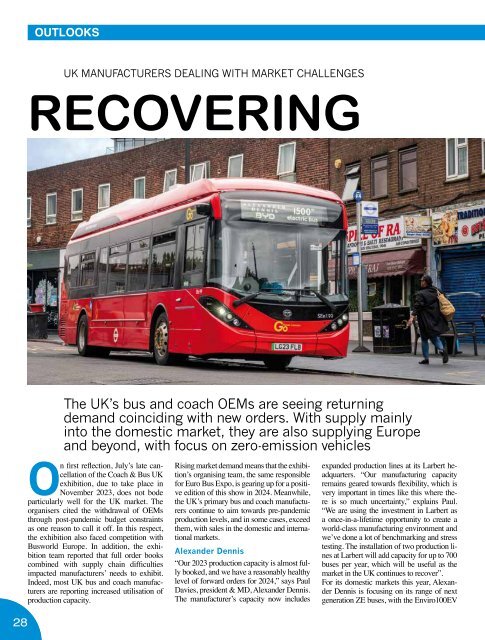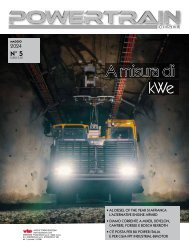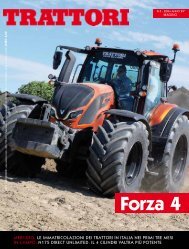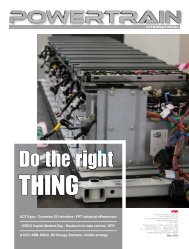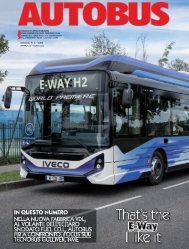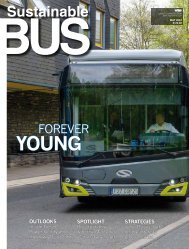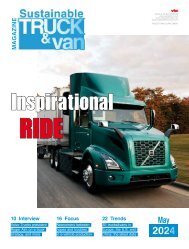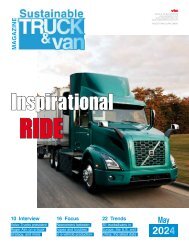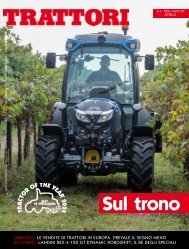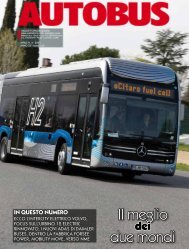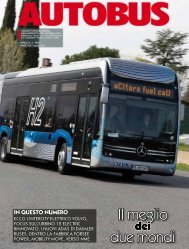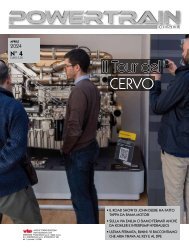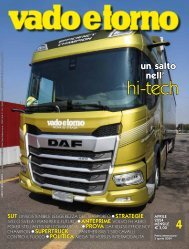2023-09 SUSTAINABLE BUS
A new issue of Sustainable Bus is out today. In this upcoming edition, we’ve curated a diverse and comprehensive range of topics that spotlight the latest developments in the world of sustainable mobility. From cutting-edge technological advancements to market insights and industry transformations, this issue promises to be a captivating exploration of the future of public transportation. What you could fine inside? Well, a market insight will offer you a detailed look at the European e-bus market, providing you with a comprehensive understanding of the mid-2023 results. The leading e-bus market in Europe is still UK: therefore, we focused our attention on that specific market with a report that sums up strategies, focus, goals of the most prominent industry players. A technology spotlight on the delicate topic of batteries, authored by Claudius Jehle, look at battery management and strategies to ensure the smooth and cost-effective operation of electric buses (with a focus on a case study from BVG). Among the pillars of our upcoming issue you’ll find a detailed journey around the European industrial bus&coach landscape. Goal? Providing our readers insights into the changing dynamics among key OEMs in the region. We’ll be then taking you behind the scenes at the Yutong factory in Zhengzhou, that we had the pleasure of visiting in June. Let’s then delve into Iveco Bus’s growing efforts in the zero-emission bus field. Finally, last but not least, a nearly-20-pages comparison between seven 12-meter battery-electric buses, gathered together in Bonn also this year by the German magazine Omnibusspiegel. You’ll find both established players and newcomers side by side: Ebusco 3.0, Hess lighTram 12m, Ikarus 120e, Iveco E-Way, Mercedes eCitaro with new batteries, Otokar e-Kent C, Quantron Cizaris 12 Ev.
A new issue of Sustainable Bus is out today. In this upcoming edition, we’ve curated a diverse and comprehensive range of topics that spotlight the latest developments in the world of sustainable mobility. From cutting-edge technological advancements to market insights and industry transformations, this issue promises to be a captivating exploration of the future of public transportation.
What you could fine inside? Well, a market insight will offer you a detailed look at the European e-bus market, providing you with a comprehensive understanding of the mid-2023 results. The leading e-bus market in Europe is still UK: therefore, we focused our attention on that specific market with a report that sums up strategies, focus, goals of the most prominent industry players.
A technology spotlight on the delicate topic of batteries, authored by Claudius Jehle, look at battery management and strategies to ensure the smooth and cost-effective operation of electric buses (with a focus on a case study from BVG).
Among the pillars of our upcoming issue you’ll find a detailed journey around the European industrial bus&coach landscape. Goal? Providing our readers insights into the changing dynamics among key OEMs in the region.
We’ll be then taking you behind the scenes at the Yutong factory in Zhengzhou, that we had the pleasure of visiting in June. Let’s then delve into Iveco Bus’s growing efforts in the zero-emission bus field.
Finally, last but not least, a nearly-20-pages comparison between seven 12-meter battery-electric buses, gathered together in Bonn also this year by the German magazine Omnibusspiegel. You’ll find both established players and newcomers side by side: Ebusco 3.0, Hess lighTram 12m, Ikarus 120e, Iveco E-Way, Mercedes eCitaro with new batteries, Otokar e-Kent C, Quantron Cizaris 12 Ev.
You also want an ePaper? Increase the reach of your titles
YUMPU automatically turns print PDFs into web optimized ePapers that Google loves.
OUTLOOKS<br />
UK MANUFACTURERS DEALING WITH MARKET CHALLENGES<br />
RECOVERING<br />
The UK’s bus and coach OEMs are seeing returning<br />
demand coinciding with new orders. With supply mainly<br />
into the domestic market, they are also supplying Europe<br />
and beyond, with focus on zero-emission vehicles<br />
On first reflection, July’s late cancellation<br />
of the Coach & Bus UK<br />
exhibition, due to take place in<br />
November <strong>2023</strong>, does not bode<br />
particularly well for the UK market. The<br />
organisers cited the withdrawal of OEMs<br />
through post-pandemic budget constraints<br />
as one reason to call it off. In this respect,<br />
the exhibition also faced competition with<br />
Busworld Europe. In addition, the exhibition<br />
team reported that full order books<br />
combined with supply chain difficulties<br />
impacted manufacturers’ needs to exhibit.<br />
Indeed, most UK bus and coach manufacturers<br />
are reporting increased utilisation of<br />
production capacity.<br />
Rising market demand means that the exhibition’s<br />
organising team, the same responsible<br />
for Euro Bus Expo, is gearing up for a positive<br />
edition of this show in 2024. Meanwhile,<br />
the UK’s primary bus and coach manufacturers<br />
continue to aim towards pre-pandemic<br />
production levels, and in some cases, exceed<br />
them, with sales in the domestic and international<br />
markets.<br />
Alexander Dennis<br />
“Our <strong>2023</strong> production capacity is almost fully<br />
booked, and we have a reasonably healthy<br />
level of forward orders for 2024,” says Paul<br />
Davies, president & MD, Alexander Dennis.<br />
The manufacturer’s capacity now includes<br />
expanded production lines at its Larbert headquarters.<br />
“Our manufacturing capacity<br />
remains geared towards flexibility, which is<br />
very important in times like this where there<br />
is so much uncertainty,” explains Paul.<br />
“We are using the investment in Larbert as<br />
a once-in-a-lifetime opportunity to create a<br />
world-class manufacturing environment and<br />
we’ve done a lot of benchmarking and stress<br />
testing. The installation of two production lines<br />
at Larbert will add capacity for up to 700<br />
buses per year, which will be useful as the<br />
market in the UK continues to recover”.<br />
For its domestic markets this year, Alexander<br />
Dennis is focusing on its range of next<br />
generation ZE buses, with the Enviro100EV<br />
Equipmake<br />
Electric drivetrain manufacturer Equipmake<br />
continues to provide an increasing number of<br />
repower conversion projects. Delivery of 12<br />
vehicles to First’s York operation is ongoing,<br />
converting Optare Versa models and providing<br />
a range between 240 to 400 km. Meanwhile,<br />
in South Wales, Equipmake has signed<br />
an agreement with Newport Transport<br />
to repower eight double deckers. This news<br />
comes on the back of Equipmake’s London<br />
trial of a New Routemaster with Metroline,<br />
and discussions are ongoing about repowering<br />
vehicles for a full route.<br />
Internationally, Equipmake has a partnership<br />
in South America with Agrale, providing an<br />
electric powertrain for a new bus, which is<br />
currently on trial in Buenos Aires. Equipmake<br />
is also initiating repowering in Indonesia<br />
with a local partner. “We’ve met our numbers<br />
for this year, and next year, the target<br />
will more than double,”, says Equipmake<br />
managing director Ian Foley.<br />
A new development for Equipmake is the<br />
move towards the coach market. The company<br />
has repowered a tri-axle Van Hool<br />
T917 for Westway Coaches, providing a claimed<br />
range of 350 km. The additional weight<br />
capacity of a three-axle vehicle meant it was<br />
easier to install the drivetrain system and<br />
meet the weight targets, and with batteries installed<br />
behind the rear wheels, luggage space<br />
isn’t impacted. Two-axle repowering is also<br />
possible, according to Equipmake, though<br />
this would impact luggage capacity.<br />
“A luxury coach can cost £500,000<br />
(€581,000). For an operator currently looking<br />
to buy a new vehicle, it’s quite a diffiand<br />
the Enviro400EV double deck bus. For<br />
the Enviro100EV, the company says that<br />
pre-orders are in line with expectations, ahead<br />
of opening volume orders when the new<br />
model launches later this year, together with<br />
the Enviro400EV. In line with this promotion,<br />
the company is positive about future<br />
demand in the UK.<br />
“The UK bus market suffered from underinvestment<br />
for a number of years pre-pandemic,<br />
and, for the last few years, we’ve seen<br />
very low levels of new bus registrations compared<br />
to historic norms,” says Paul. “Clearly<br />
there are a lot of changes at a bus operator<br />
level that impact on new bus demand, but we<br />
believe the fundamentals remain strong and<br />
that investment in new fleet will return”.<br />
International markets continue to be a key<br />
element of the Alexander Dennis strategy.<br />
This is led by the 82-seat Enviro500EV,<br />
which the company is delivering to both<br />
KMB and MTR Corporation in Hong Kong,<br />
as well as ambitions beyond. “There is returning<br />
interest in double deck transit buses in<br />
North America, which we are excited about<br />
and have taken new orders,” says Paul. “In<br />
continental Europe, we are focusing on opportunities<br />
for double deck buses tailored to<br />
individual requirements, such as those we’ve<br />
built for Switzerland and Berlin”.<br />
Following involvement in Scotland’s<br />
CAVForth driverless bus trials, reported as<br />
the world’s first full-sized self-driving bus<br />
service, what role will ADL have in the future<br />
of driverless transit? “We expect interest<br />
in autonomous capabilities for buses<br />
to grow further over the next few years as<br />
projects like CAVForth and the Dubai World<br />
Challenge for Self-Driving Transport prove<br />
Wrightbus sales for the year,<br />
as of July, are 254 units, and<br />
the group plans to build over<br />
600 vehicles in total in <strong>2023</strong>.<br />
Over 90% of these will be zero-emission<br />
buses, compared<br />
to 64% last year. Over 90% of<br />
its orders are for the UK and<br />
Ireland, though Wrightbus<br />
says it is in the process of<br />
expanding into Europe.<br />
No further news is forthcoming<br />
regarding production<br />
commencing at Switch’s<br />
Valladolid, Spain plant. As of<br />
July 2022, Switch planned<br />
bus manufacture for the European<br />
market to begin within<br />
12 months.<br />
the viability of a variety of use cases for the<br />
technology,” says Paul. “Legal and operational<br />
frameworks in different countries will<br />
mean that transitions will differ, which is<br />
why we’re developing flexible solutions that<br />
can be tailored to local requirements.<br />
cult decision because in a few years time you<br />
probably won’t be able to run it in cities. An<br />
alternative is to refurbish the coach and repower<br />
it, giving a lower risk option than buying<br />
a new vehicle”.<br />
Ian says that, depending on battery capacity,<br />
the cost of repowering a coach ranges<br />
from approximately £170,000 (€197,700) to<br />
£230,000 (€267,500).<br />
Mellor<br />
Since opening orders of its zero emissions<br />
Sigma bus range in August 2022, Mellor now<br />
has 150 zero emission buses sold or on order.<br />
In addition, it plans to produce around 250 of<br />
its Euro 6 diesel minibuses in <strong>2023</strong>. To fit the<br />
growing demand, the company is actively<br />
investigating expansion of its manufacturing<br />
capacity, which is currently centred around<br />
its Rochdale plant. “The growth level into<br />
2024 for Mellor is going to be very strong,<br />
based on existing orders with a pipeline of<br />
opportunities in the UK and internationally,”<br />
says Gustavo Marqueta-Siibert, group business<br />
development director for WNVTech,<br />
Mellor’s parent organisation.<br />
The company has a 50/50 split of sales<br />
between the domestic and international markets.<br />
In Europe, Mellor’s biggest contract has<br />
been to supply 42 of its Sigma 7 models to<br />
Connect Bus in Gothenberg, Sweden. Mellor<br />
will shortly announce details of supply into<br />
Canada, expected to start early next year.<br />
This year, Mellor has also launched two<br />
high-floor electric bus models that focus<br />
on accessibility including a wheelchair lift.<br />
Based on the Sigma 7, the vehicle can carry<br />
up to seven wheelchairs, while the Sigma<br />
9-derived version can carry up to 10 wheelchairs.<br />
The company also expects to make<br />
an announcement about the launch of its first<br />
electric minibus in the M2 category.<br />
Pelican-Yutong<br />
Pelican Bus & Coach, Yutong’s UK impor-<br />
28<br />
29


